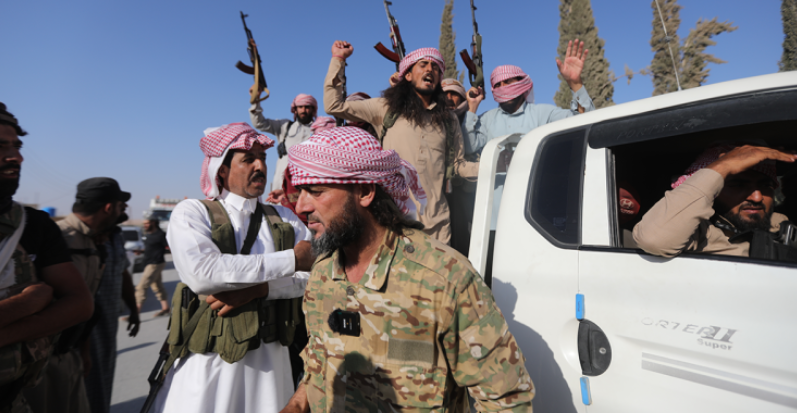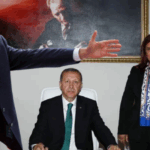A coalition of Arab tribes has declared a “general mobilization” against the Syrian Democratic Forces (SDF), underscoring growing tensions over the stalled plan to integrate the Kurdish-led force into Syria’s new army. The announcement comes as tribal militias are playing an increasingly prominent role in the country’s political and military order, both in the northeast and in recent fighting in the southern province of Suwayda.
This tribal mobilization took place on the same day that a high-profile Syrian delegation visited Ankara and signed a new Syrian–Turkish defense cooperation agreement, underscoring the convergence of military developments on the ground with regional diplomatic moves. The agreement, finalized during meetings between Turkey’s Foreign Minister Hakan Fidan and Syria’s Foreign Minister Asaad al-Shibani, includes provisions for military training, consultation, and enhanced coordination between the two countries’ armed forces.
During their joint press conference, both ministers urged the Syrian Democratic Forces (SDF) and its dominant Kurdish faction, the People’s Protection Units (YPG), to implement without further delay the March integration agreement, which calls for the SDF to be incorporated into the Syrian army under a unified command. Fidan stated that any action undermining Syria’s unity and stability would “no longer be tolerated,” signaling a coordinated stance from Ankara and Damascus after years of mutual hostility.
In coordinated statements, leaders of the al-Bubna Shabaniyah, al-Bu Jabr, al-Bu Sha’ban, al-Bu Zaher, al-Walda, al-Huwaitat, al-Afadla, al-Amirat, al-Jabat, and Bani Asid al-Hashimi tribes pledged to mobilize their members. Suleiman Mashi of the al-Bubna Shabaniyah tribe declared the mobilization would remain in effect “until an order to the contrary is given.” The al-Bu Jabr called for prioritizing the homeland over internal divisions, while the Bani Asid al-Hashimi pledged support for state institutions in the face of what it described as separatist agendas.
The mobilization follows a recent U.S. Department of Defense inspector general’s report warning that tensions between Arab tribes and the SDF could escalate as U.S. forces scale back their presence. The report noted that American troops had withdrawn from the Green Village, Conoco, and Euphrates Mission Support Site bases, handing over facilities to the SDF—an arrangement some analysts say could be seen locally as consolidating Kurdish authority in historically Arab areas.
While the confrontation in the northeast reflects long-standing Arab–Kurdish mistrust, it also fits into a broader national pattern in which tribal militias have emerged as decisive actors in the post-Assad landscape. As noted earlier by Geopolist (Istanbul Centre for Geopolitics), Damascus relies heavily on identity-based armed groups to maintain order and project influence, while employing conventional forces selectively.
That approach has been especially visible in Suwayda, where violent clashes erupted earlier this summer between Druze defense forces and Arab Bedouin tribes. What began as a local dispute over the kidnapping of a Druze trader escalated into the mobilization of more than 40 Arab tribes, with tens of thousands of fighters—many reportedly moving from Idlib, Hama, Aleppo, Homs, and Deir ez-Zor—entering Suwayda’s cities. According to local and regional observers, the mobilization carried jihadist slogans and likely enjoyed coordination or tacit support from HTS.
The Suwayda crisis drew in multiple external actors. Israeli airstrikes on Damascus signaled that HTS Interior and Defense units would not be permitted to enter the province directly, even as tribal forces advanced. In response, some Druze factions launched retaliatory attacks on Bedouin civilians, prompting a cycle of reprisals. A U.S.- and Israeli-brokered ceasefire was eventually announced by U.S. Special Envoy Thomas Barak, involving the Syrian presidency, Israel, Turkey, and Jordan. While earlier ceasefire proposals from HTS had been rejected by Druze spiritual leader Sheikh Hikmat al-Hijri, the latest agreement—negotiated with guarantor states—was accepted.
Geopolist has drawn a parallel between the mobilization of Arab tribes in Suwayda and the late Ottoman practice of deploying the Hamidiye Light Cavalry Regiments. These tribal auxiliaries were used to extend imperial control into outlying areas.. Like the Hamidiye, the new tribal formations have been given political recognition, arms, and a degree of autonomy in exchange for their service in extending central authority. In Suwayda, their deployment allowed the government to reassert influence while reducing the risk of direct confrontation with Israel. In the northeast, they offer a potential counterweight to Kurdish-led forces without requiring large-scale redeployment of state troops.
The historical analogy also carries a warning. The Hamidiye regiments, while effective in expanding Ottoman reach, often pursued their own agendas, engaged in intercommunal violence, and provoked external intervention. In today’s Syria, the empowerment of semi-autonomous tribal militias risks inflaming sectarian and ethnic tensions, undermining central authority, and creating openings for foreign actors to intervene under the pretext of protecting vulnerable communities. Israeli leaders have already framed their stance in Suwayda in terms of defending the Druze minority, a posture that could be used to justify an expanded and more permanent presence in southern Syria.
For the SDF, the growing role of Arab tribal militias poses a direct challenge to its position in the northeast. Commander Mazloum Abdi has condemned violence against civilians in Suwayda and warned against the spread of sectarian conflict. Yet within days of the tribal mobilization in the south, similar calls to arms have now emerged in the northeast—bringing the same model of proxy mobilization to the Kurdish–Arab fault line.
The integration agreement signed on March 10 between the SDF and HTS, intended to bring the SDF under the Syrian army’s structure, remains stalled. The SDF has insisted on retaining its internal command and joining as a unified bloc. Following increased calls for decentralization at the joint conference of Syrian components held in Hasakah on August 8, HTS decided to withdraw from a planned meeting with the SDF in Paris, France.
On the ground, clashes between the SDF and Syrian government forces are intensifying, particularly around Aleppo. The SDF accuses pro-Damascus militias of provocations in Deir Hafer, warning it will “exercise the right to legitimate self-defense” if attacks persist. The Syrian Ministry of Defense, for its part, says SDF-linked fighters tried to infiltrate army positions in Tel Maaz, killing one soldier, and shelled positions in Deir Hafer and Manbij. Damascus warned that continued violations of signed agreements “will lead to new consequences.”
In both Suwayda and the northeast, the expanding role of tribal militias illustrates how Syria’s political center now governs through localized armed actors whose loyalties are often transactional. The convergence of tribal mobilization on the ground with high-level defense agreements abroad signals a Syria entering a new phase—one in which the central state’s reach increasingly depends on the management of armed intermediaries and the political choreography of its regional allies. In theory, such a system could knit disparate actors into a coherent security framework; in practice, history suggests that the autonomy granted to these groups can quickly turn from a tactical asset into a strategic liability, as seen during the late Ottoman era.
By: News About Turkey (NAT)



